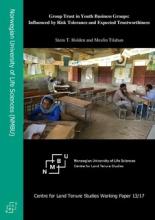Land Library
Welcome to the Land Portal Library. Explore our vast collection of open-access resources (over 74,000) including reports, journal articles, research papers, peer-reviewed publications, legal documents, videos and much more.
/ library resources
Showing items 28 through 36 of 136.This chapter is written for the European Commission for a book to be published by Springer on The Role of Smallholder Farms in Food and Nutrition Security. The author takes full responsibility for the content.
We analyzed lab-in-the-field trust and risk experiment with 1125 youth in 119 youth groups established as primary cooperatives to develop a joint business. The experiments were implemented using classrooms in local schools as field labs.
Although development intervention programs can have far-reaching impacts beyond their stated objective, there have been few careful studies of unintended outcomes of such programs.
The paper utilizes household panel data to investigate whether the land rental market can facilitate improved access to land for land-poor tenant households over time and thereby facilitate expansion of their farming activity.
Climate risk represents an increasing threat to poor and vulnerable farmers in drought-prone areas of Africa. This study assesses the fertilizer adoption responses of food insecure farmers in Malawi, where Drought Tolerant (DT) maize was recently introduced.
The land registration system in Kenya was established in 1897 to support land registration for white settlers who had come into the country during the 19th Century.
In this paper, we present an optimized Machine Learning (ML) algorithm for predicting land suitability for crop (sorghum) production, given soil properties information.
Under the new Constitution of Kenya, 2010, the County Government is now vested with the authority to ensure that land owned by county residents is used for the purposes it has been intended for by the Director of Physical Planning established under the Physical Planning Act.
Land administration arrangements and practices in any country influence the pace and outcomes of social and economic developments. Since the United Nations adopted the Sustainable Development Goals (SDGs), nations have been encouraged to take initiatives to attain the SDG targets.









